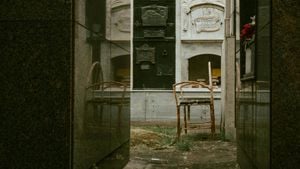On February 4, 2025, during a live broadcast of Sportitalia, the director Michele Criscitiello made headlines after dismissing journalist Manuel Parlato on air. The incident occurred as the two discussed the Napoli football team's recent activities
Parlato had critiqued the irreverent humor displayed during the previous show by Criscitiello and fellow reporter Tancredi Palmeri, which seemed to mock Napoli’s performance on the football transfer market. He remarked, "We are the world champions of irony, we like to ironize, but it seemed like a bit of provocation. We expect the same jokes to be made for other teams too." This seemingly innocuous comment provoked immediate and vehement backlash from Criscitiello.
Reacting to Parlato's remarks, Criscitiello interjected sharply, "Manuel, ciao e buonanotte. Vai a lavorare a Canale 21, via. Hai sbagliato televisione. La poesia la fai altrove. Cambia canale e fai il tifoso a casa tua. Chiudiamo il collegamento con Manuel che qua dentro non ci lavora più," effectively ending their connection and Parlato's career at Sportitalia on the spot.
The abrupt nature of this dismissal drew swift condemnation from the Order of Journalists of Campania. They expressed solidarity with both Canale 21 and Parlato, stating, "The disparaging attitude toward Canale 21 and the words directed at Manuel Parlato represent an unacceptable attack on the freedom of expression of a journalist, guilty only of defending his city." The Order hinted at potentially filing disciplinary measures against Criscitiello with the Lombardy Order.
The incident also spurred the Campania Journalists’ Union (SUGC) to voice support for Parlato, describing his live firing as outrageous. They emphasized the need for accountability and respect for journalistic integrity.
Manuel Parlato, reflecting on Criscitiello’s spur-of-the-moment decision, remarked, "It seems the jokes about Napoli were well received by some, but they should also be made fairly about other teams. We have to treat all clubs equally." This statement highlights the fragile balance media personalities must maintain, especially when representing local clubs.
Following the incident, discussions ignited across social media and journalism circles about media ethics and respect within sports discussions. Observers noted Criscitiello’s comments, particularly his references to the "middle-class Neapolitans," crossed professional lines and raised questions about his leadership style at Sportitalia.
The broader ramifications of such incidents extend beyond personal conflicts on set. This episode sheds light on the potential chilling effect on journalists who may now feel fearful of voicing unpopular opinions, especially when they are critiquing their employers. The dismissal could deter journalists from candid discussions about sports and performances, contradicting the spirit of sports journalism where criticism and humor often go hand-in-hand.
Returning to Criscitiello’s decisions, some supporters of his might argue he was within his rights to uphold the channel's editorial line. Others, meanwhile, see his actions as detrimental to the principles of open dialogue. This incident serves as both a cautionary tale and as a case study for future encounters within the fast-paced, often heated world of sports media.
By reinstilling traditional journalistic ethics and promoting respectful discourse, sports networks can create environments where journalists feel empowered to present diverse viewpoints and tackle pressing issues creatively and constructively.
The incident involving Michele Criscitiello and Manuel Parlato may come to symbolize not just one conflict but potentially signify shifts within sports journalism, calling attention to the responsibilities of media professionals to maintain ethical standards, regardless of the pressures they face.



